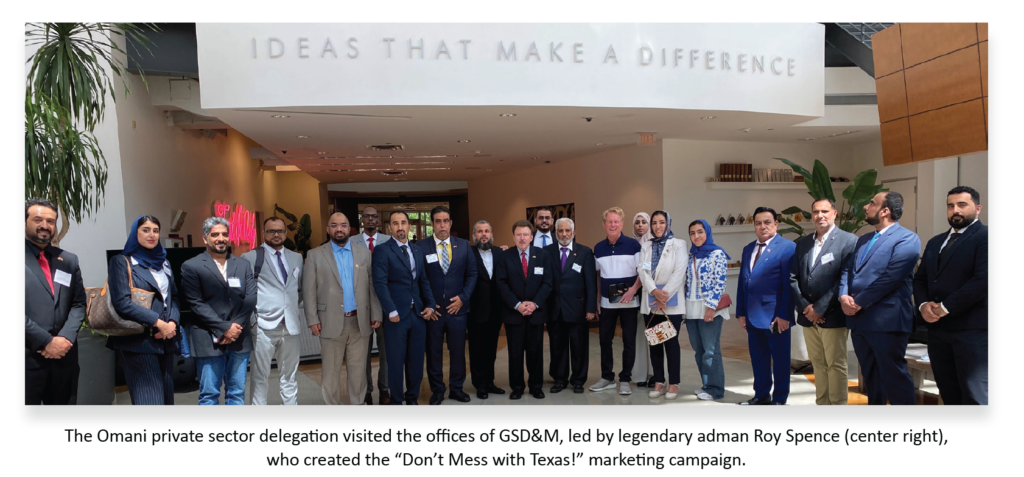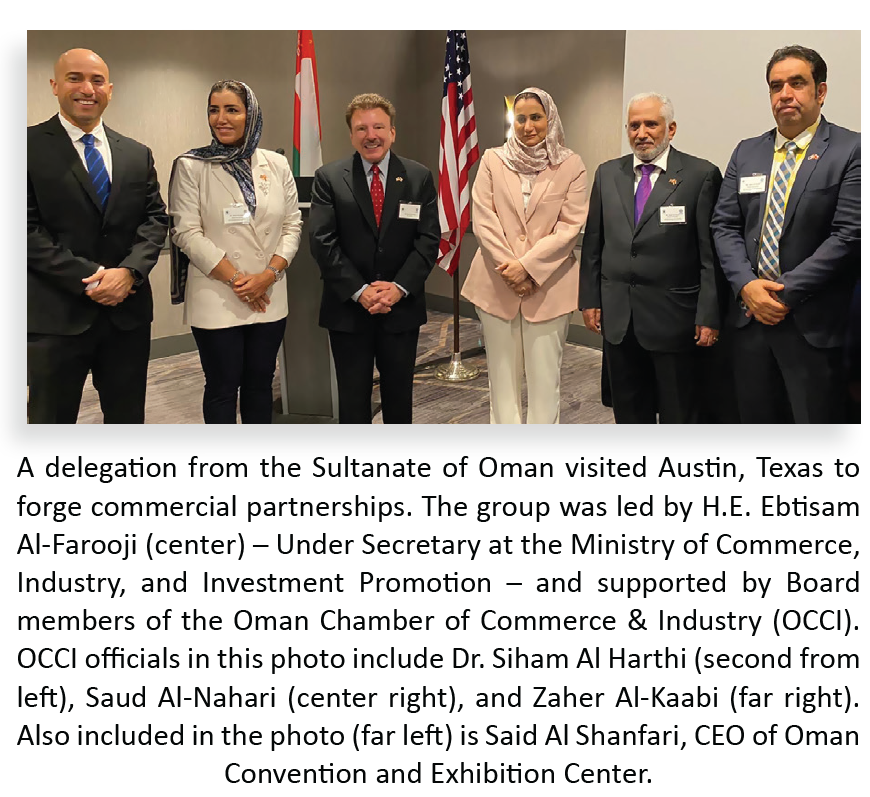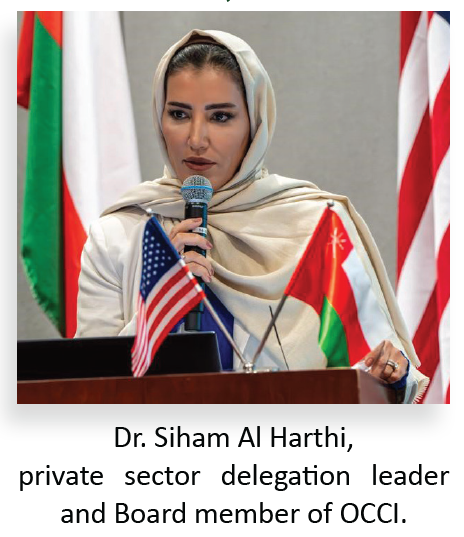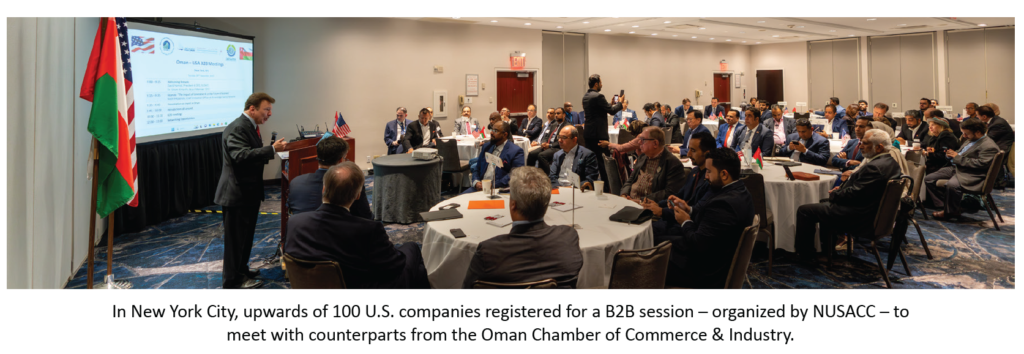Oman Chamber Delegation Visits Texas and New York
Oman Vision 2040 and Oman-U.S. Free Trade
Agreement Help to Drive Commercial Partnerships
As the USA becomes Oman’s second largest foreign direct investor, two-way trade grows to $4.22 billion, the highest level ever

The Oman Chamber of Commerce & Industry (OCCI) has just completed a ten-day trade mission to Houston, Austin, and New York City. With a delegation consisting of 12 business leaders, OCCI held site visits and business-to-business (B2B) meetings with American counterparts in all three cities.
The National U.S. – Arab Chamber of Commerce (NUSACC) – working with more than a dozen partner entities – organized meetings in Austin and New York City (including Brooklyn), cutting-edge cities that are hotbeds of innovation.
“This is one of the largest Omani delegations ever to visit the United States,” said David Hamod, President & CEO of NUSACC. “They did an excellent job of highlighting business opportunities in the Sultanate across a range of sectors, and we are confident that business deals will happen as a result of this visit.”
The Omani delegation was co-led by a government official (Her Excellency Ibtisam Al Farooji, Under Secretary for Investment Promotion in the Ministry of Commerce, Industry, and Investment) and a business leader (Dr. Siham Al Harthi, Board member of OCCI). Supporting the visit were Oman’s Under Secretary for Communications and Information Technology – H.E. Dr. Ali Al Shidhani – as well as two additional OCCI Board members: Saud Al Nahari (Chair of the Investment Committee) and Zaher Al Kaabi (Chair of OCCI in Buraimi).

Leading sectors in the business delegation featured heavy & light manufacturing, medical devices, oil & gas, telecoms & ICT, engineering, foodstuffs, and agriculture. Profiles of participating Omani companies may be found here.
With its strategic location, strong infrastructure, and business-friendly government policies, the Sultanate of Oman is positioning itself to serve as a global business hub for emerging markets around the Middle East, Asia, and Africa. An “Invest Oman” presentation may be found here.
Public Private Partnerships
The Government of Oman and that nation’s private sector work hand-in-hand to create opportunities for trade and investment. Public Private Partnerships (PPPs) are an important part of Oman’s commercial success over the years. Today, the Sultanate’s business community is taking an increasingly proactive role in promoting economic development and capacity-building.
In highlighting such partnerships, the head of the private sector delegation, Dr. Siham Al Harthi, accentuated the positive trajectory in Oman – U.S. commercial relations. “The importance of this meeting cannot be overstated,” she noted. “We have gathered here not only to exchange ideas and experiences . . . but also to emphasize our commitment to cooperation and the advancement of business opportunities.”
The commercial relationship between Oman and the USA has historically been based on oil and gas, she suggested, including manufacturing and petrochemicals. But the Oman Chamber delegation, she noted, is also looking to deepen commercial ties in such forward-looking sectors as:
* Renewable energy
* Technology and Innovation (including ICT, cybersecurity, and data analytics)
* Healthcare and pharmaceuticals
* Education and training (including exchange programs and partnerships among educational institutions to enhance knowledge-sharing and skill development).
The Oman – U.S. Free Trade Agreement “is a big part of our success story,” Dr. Siham stated, “and the new agreement with the U.S. EXIM Bank will facilitate procurement of U.S. goods and services for government projects in the Sultanate of Oman, specifically in such sectors as wireless communication, biotechnology, renewable energy, agriculture, and manufacturing.” (That MOU, signed in February 2023, makes available up to $500 million toward the purchase of U.S. goods and services.)
Dr. Siham concluded, “We see today’s meeting as an opportunity to make our partnership even stronger. We are eager to ensure that our partnership continues to grow and succeed.”

The FTA + Investment: A Snapshot
The Oman – U.S. FTA, which entered into force on January 1, 2009, is one of four FTAs between the United States and nations in the Arab world.
Designed to promote trade between these two long-time partners, the FTA provides export advantages for Omani firms over other companies around the globe. In part because of this FTA, total two-way trade between Oman and the USA grew to $4.22 billion in 2022, the highest level ever between the two nations.
U.S. goods exports to Oman grew to nearly $1.5 billion in 2022, an increase of six percent from 2021. A one-page summary detailing U.S. exports to Oman in 2022 may be found here.
Oman’s goods exports to the USA grew from $813.5 million in 2020 to $1.75 billion in 2021, surpassing U.S. exports to Oman for the first time since 2011. In 2022, Omani exports to the USA grew still further, to $2.71 billion.
In February 2023, Oman hosted the first U.S.-Oman Strategic Dialogue, which focused on education and cultural exchange, trade and investment, and renewable energy. On the sidelines of this event, the Export-Import Bank of the United States (EXIM) and the Government of Oman signed a memorandum of understanding to use up to $500 million in EXIM financing to establish projects in wireless communications, biotechnology, renewable energy, agriculture, water and wastewater treatment, mining, and manufacturing, among other sectors.
According to the U.S. Embassy in Muscat, Oman’s main exports to the United States are industrial supplies, aluminum, fertilizers, jewelry, and oil by-products, such as plastics.
Oman’s “gold standard” FTA has also had a positive impact on investment. In 2022, the USA was the second largest foreign direct investor in Oman, and the USA is on track to do the same in 2023. Total FDI in Oman recently reached $50.41 billion, with the U.S. contributing $7.04 billion, equivalent to nearly 14 percent of total FDI.
According to Muscat Daily, U.S. FDI reached RO3.508 billion ($9.11 billion) at the end of Q1 2023. FDI flows from the USA jumped more than 73 percent to RO1.093 billion ($2.84 billion) in Q1 of 2023, compared to RO630 million ($1.63 billion) recorded during the same period of 2022.
Oman Vision 2040
The centerpiece of Oman’s economic development strategy is Oman Vision 2040, which may be accessed here.
One priority of Vision 2040 revolves around the private sector, investment, and international cooperation. Specifically, Oman envisages an empowered private sector driving a national economy that is competitive and aligned with the global economy.
Commercial partnerships are at the heart of Oman’s private sector strategy. In this context, the Omani trade delegation’s visit to the USA was both timely and consistent with the Sultanate’s development strategy. According to Vision 2040:
“A competitive economy led by the private sector will make use of several advantages that the Sultanate enjoys,
particularly the political and economic stability and the long-term investment of strategic relations. The strategic geographic location of the Sultanate is an excellent opportunity to develop and expand trade partnerships with other countries worldwide.”
“Through this location, the Sultanate seeks to foster investment partnerships between the Omani private sector and the international business community by attracting foreign direct investments of high quality to meet the new global demand and support the Sultanate in becoming an international trade hub.”
Visit to Austin, Texas
Austin is a hub for innovation, with a special emphasis on education, software/ICT, and biosciences.
Omani delegates were welcomed to Central Texas by: Hon. Lee Leffingwell, former Mayor of Austin; Steve Jakobs, a trustee of Austin Community College; Matt Curtis, Founder of Smart City Policy Group (and a chief of staff to two former Austin mayors).
Leffingwell discussed insights about Austin’s remarkable growth and shared “lessons learned” that could help Oman in its quest to grow the economy while maintaining a high quality of life. Jakobs talked about the intersection among industry, government, and the community, especially the importance of preparing graduates for the workplace. Both leaders emphasized the need to support “white collar” and “blue collar” communities because successful cities need both.
In this spirit, the delegation visited two campuses of Austin Community College, recognized nationwide for its innovative programs. The visit to the Elgin campus concentrated on sustainable agriculture and veterinary science, while a visit to the Highland campus focused primarily on manufacturing, innovation, health & biosciences, and food science. Both campuses – two of 11 ACC campuses – place a heavy emphasis on practical training for the workforce (which is a priority in the Sultanate of Oman).
The Omani delegates were warmly received by the Chamber of Commerce in Round Rock, one of the fastest growing communities in America. The Chamber’s President & CEO, Ms. Jordan Robinson, highlighted Round Rock’s success in attracting investors (Elon Musk, Michael Dell, Samsung, and others). Big ticket investments like these have helped to transform the economic landscape in Austin and Round Rock, where the average annual salary is now $72,000.
Delegates visited one of the largest plants in Round Rock, East/West Manufacturing Enterprises, a 43,000 square foot facility that produces high-quality PCB assemblies, custom cables, and electrical/mechanical assemblies for many industries globally. Customers include FedEx, Audi, HP, AMD, Foxconn, Texas Instruments, and more.
Omani delegates who focus on agriculture and food science received a VIP welcome at Texas A&M University, home to the world-famous Norman Borlaug Institute for International Agriculture. The Institute develops, coordinates, and leads international agricultural development programs in the following areas: Agriculture & Food Security, Economic Growth & Trade, Education, Environment & Global Climate Change, Gender Equality & Women’s Empowerment, Water & Sanitation, and Working in Crises & Conflict.
Oman is taking steps to “globalize” its advertising, so a visit to GSD&M – one of America’s most iconic advertising firms – was a must. Legendary ad man Roy Spence personally escorted the delegates around the firm, one of the largest of its kind in the USA.
The four co-founders of GSD&M (including Roy Spence) “helped to elect a President [Bill Clinton], launch an airline [Southwest], turn Walmart into a global retail force, and even gave Texas its rallying cry [‘Don’t Mess with Texas’].”

Visit to New York City
The delegation’s visit to New York City, a highlight of the trip, focused on business-to-business meetings. Upwards of 100 U.S. companies from New York, New Jersey, Delaware, and Pennsylvania signed up to meet the Omani delegates in Manhattan. In addition, delegates held virtual meetings with leading companies around the USA.
Delegates also toured Brooklyn, one of New York City’s five boroughs. A manufacturing hub for generations, Brooklyn has now become one of New York’s trendiest locations. According to The Travel:
“Brooklyn is an incredible place to not only visit, but to live. So much so, that there has been a significant influx of people trying to move there in recent years as it has started to surpass the other boroughs in popularity and is now considered the ‘cool’ one, with its vibrant mix of music festivals, a big art and foodie scene, and a nightlife that offers the trendiest bars.”
Hosted by Randy Peers, President & CEO of the Brooklyn Chamber of Commerce, the delegation visited former shipbuilding facilities and warehouses that are now used for light manufacturing, international food courts, innovation centers, offices for SMEs and microenterprises, and the like.
Brooklyn is an increasingly important port city for cruise ships, and it may help to serve as a model for the Sultanate. According to Peers, “Having an infrastructure in place to provide support to the growing cruise industry is good for our local economy . . . Brooklyn will provide the cruise operators with operating stability, while ensuring that investments are being made to locally support small businesses, schools and workers.”
Site visits in New York City were rounded out by the global law firm of Reed Smith LLP, which is doing business with the Sultanate. That meeting was led by Casey Ryan, who became Managing Partner and Chair of the firm’s Executive Committee earlier this year. As such, she is the 12th Managing Partner in Reed Smith’s 146-year history and the first woman to hold the global firm’s top leadership position.
AI Visionary Headlines Speakers in NYC
Artificial Intelligence (AI) has the potential to fundamentally transform relationships among countries, including Oman and the United States. Robert Kirkpatrick, an AI visionary and Chief Innovation Officer at Knowledge Capital Network, served as keynote speaker at Oman’s B2B session in New York City. Excerpts of his remarks are below.
I served as the founding Executive Director of the UN Secretary General’s Innovation Lab, UN Global Pulse. We focused on data science and artificial intelligence, learning how to unlock all the big data in the world for the public good.
Early on, it was all about making the invisible become visible, which is something these technologies can do. For example, we found that we could track commodity prices across Indonesia in real time through an analysis of Twitter. We found out how much money people in Sub-Saharan Africa spend on topping off their airtime credit every week, which almost perfectly predicts how much those families are spending on food every day. We could use debit card transactions in Mexico to understand how severely communities were impacted by natural disasters and who was recovering faster than others. We used mobility information from ships in the Mediterranean to detect the signatures of rescues of Libyan refugees.
I have been working with this technology for almost 20 years, and I did not think I would live to see the capabilities that have come into existence in the past two years. In the field of medicine, for example, generative AI will be able to create digital twins of full sets of human physiology, including your individualized physiology, and then simulate the impact of any drug within your body.
In the business world, generative AI is going to be an absolute game-changer, starting with the ability to simulate millions and millions of variations of a product without having to physically produce a prototype. AI is not limited by human assumptions of what’s possible or useful or appropriate, which means it’s going to generate designs that would never occur to a human being.
We will see a huge uptake in generative AI: Enhanced prototyping, supply chain optimization, materials innovation, predictive maintenance, resource optimization, quality management, workforce training, collaborative operations on a factory floor, transformation of business models, consumer engagement, and other applications.
Finally, we have a few decisions to make as a society. For example: Just because we can replace a specific job with AI does not mean we should do it. This is something that we worried a lot about at the UN, and the potential of this technology to further concentrate wealth far beyond what the first generation did in digital advertising is quite unimaginable. AI should always be used in ways that preserve human agency, human dignity, and human rights.
The “Five Ss” of Oman: A Chamber Perspective
In his remarks in Austin and New York City, David Hamod – NUSACC’s President & CEO – highlighted the “five Ss” that help to distinguish Oman from other countries:
1) Strategic – As a trade & investment platform, Oman occupies a very strategic position. A four-hour flight from Oman can reach the MENA region, the Mediterranean, Africa, and the Indian Subcontinent.
2) Secure – Oman gets along with everyone, so the country faces few external or internal threats. As a result, it is one of the safest and most family-friendly destinations in the MENA region.
3) Sustainable – Oman was the first country in the region to create a ministry of the environment with a view to promoting sustainability and protecting the nation’s natural resources.
4) Scalable – Oman’s small and medium-sized enterprises (SMEs) are on the lookout for comparably sized partners from the USA and other nations. Put another way: You don’t have to be a “giant” to do business in the Sultanate.
5) Sunshine – Oman is blessed with ample sunshine, which makes it an attractive destination year-round. The Sultanate used to be the “best kept secret” for tourism in the region, but not any more. In a recent Travel + Leisure ranking of top resort hotels in the MENA region, Oman featured two of the top five properties.
But Oman’s most important asset, Hamod said, begins not with an “S,” but with a “P”: The people of Oman are among the friendliest and most welcoming in the world.
Last Words: Looking to the Future
“NUSACC was privileged to support the visit to Austin and New York City by our sister chamber, the Oman Chamber of Commerce & Industry,” said NUSACC’s David Hamod. “The delegates sent a strong message that Oman is ‘open for business’ and is looking for American partners to help develop commercial opportunities in the Sultanate.” Hamod concluded, “Through mutual respect and exchanges of technology and know-how, Oman and the United States are poised to move our partnership to the next level.”
Dr. Siham Al Harthi, a Board member of the Oman Chamber – and head of this private sector delegation – said, “We extend our heartfelt gratitude to NUSACC for their invaluable support in orchestrating the B2B meetings in Austin and New York as part of the Omani road show in the USA. Their dedication and expertise facilitated meaningful connections, fostering international collaboration and strengthening our global partnerships.” Dr. Siham concluded, “We are immensely grateful for their pivotal role in our successful mission, a testament to the enduring support we cherish from our esteemed partners.”
To view the report in PDF, please click here.
To read the previous article, please click here.
Visit Arab America’s blog here!








